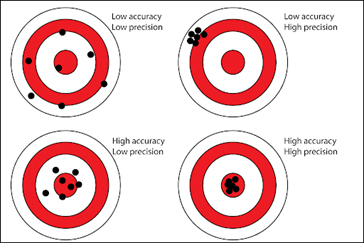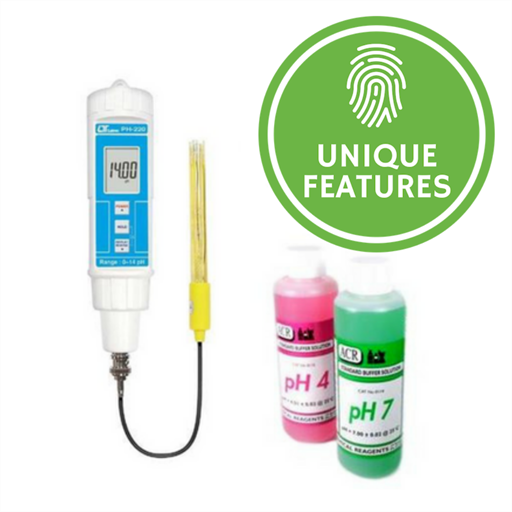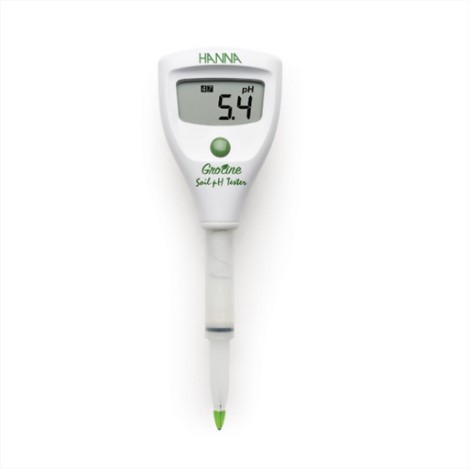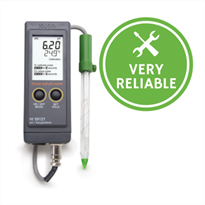Are Soil pH Testers Accurate?

The pH of the soil impacts a plant’s growth potential in several ways. A common question that arises when evaluating a new soil pH tester is, “how can I be sure this soil pH tester is accurate?”
We are so glad you asked! Instrument Choice Scientists have recently conducted a study on how to determine soil pH accurately, and how to maintain your tester to ensure your equipment’s sensors are as precise as possible.
About Soil pH Testers
Soil pH testers are simple-to-use devices that measure the acidity or alkalinity of a soil. Soil pH is vital for plant growth as it affects the uptake of critical nutrients. When soil pH is outside the range required by your plants, they will not grow to their full potential.
While each species of plant has its ideal pH range, most plants prefer a soil pH range between 5.5 to 7.5. Soil pH testers enable users to determine the pH of soil quickly but, how do you know the reading is accurate?

About Soil pH Tester Accuracy
Accuracy is the degree to which the result of a measurement, calculation, or specification conforms to the correct value or a standard.
An inaccurate pH meter could have detrimental consequences for your plant growth and wellbeing, as it could result in incorrect soil pH corrections. Moreover, an inaccurate soil pH tester defeats the purpose of owning a pH tester in the first place!
The tips below will help ensure the measurements you take are precise.
How to ensure accuracy?
There are five ways to ensure accuracy:
- Purchasing: When purchasing a new pH meter, you must factor accuracy into your decision-making process. Increased accuracy often correlates with increased cost, so try to find a balance between accuracy and affordability. If you need help finding this balance, speak to an Instrument Choice Scientist.
- Calibrate: Periodically calibrate your pH meter to ensure accurate results. Instrument Choice Scientists recommend calibrating to a minimum of two points for enhanced accuracy. View the full range of pH calibration solutions.
- Maintain: After each use, rinse before storing your pH tester away. However, over time you can expect a film of dirt and grime to build-up on the device’s pH electrode. This accumulation will result in inconsistent pH measurements. If this occurs, we recommend cleaning your pH tester using an Electrode Cleaning Solution. The electrode cleaning solution removes muck from the electrode without compromising its accuracy.
- Store: Depending on your soil pH tester’s make and model, you may need to store the pH electrode in a storage solution. The storage solution keeps the electrode primed and ready for accurate measurements.
- Some pH meters feature replaceable electrodes. If your tester is unable to calibrate, takes erratic readings, or is visibly damaged, replace the electrode (and not the whole unit) to ensure precise measurements.
Examples of Soil pH Testers and their Accuracy
Direct Soil pH Measurement Kit
Product Code: HI99121
The HI99121 features a conical, rugged electrode tip suitable for directly inserting into moist or soft soil. For harder soils, the kit includes a plastic auger to perforate the ground.
Accuracy: ±0.02 pH At 20°C and ±0.5°C up to 60°C; ±1°C outside.
Replaceable Electrode: Yes
 Soil pH Meter with Separate Electrode
Soil pH Meter with Separate Electrode
Product Code: PH220S
The PH220S is a highly accurate soil pH meter that comes with a separate electrode for enhanced measurements and usability.
Accuracy: ±0.07pH (pH5-pH9)
Replaceable Electrode: Yes
GroLine Soil pH Tester
Product Code: IC-HI981030
 The HI981030 GroLine soil pH t ester is an application-specific designed pH tester for the measurement of soil pH. This meter offers many advanced features, including the ability to clear any clogging of the reference junction, which results in a longer life than standard pH testers.
The HI981030 GroLine soil pH t ester is an application-specific designed pH tester for the measurement of soil pH. This meter offers many advanced features, including the ability to clear any clogging of the reference junction, which results in a longer life than standard pH testers.
Accuracy: ±0.2 pH at 25°C
Replaceable Electrode: No
Conclusion
Whether you are looking to purchase a new soil pH tester or already have one, the tips listed in the article above will help you ensure you always take accurate soil pH measurements.
If you have more questions or need a hand finding a meter or buffer solutions that match your needs, contact one of the Instrument Choice Scientists. We’re experts in how to achieve consistent soil pH tester accuracy! Call 1300 737 871 or email customer-service@instrumentchoice.com.au.
Also interesting
Kestrel Instruments designs and manufactures a range of portable, accurate, and reliable weather measuring devices, ranging from simple-to-use meters designed to aid observations and predictions to multi-parameter meters for professional use. This article profiles the sophisticated range of Kestrel sensors, including six units in a series beginning with the Kestrel-1000 to the Kestrel-3500-DeltaT.

Indoor air quality readers are devices designed to monitor the quality of air within any indoor environment. There is an enormous selection of indoor air quality readers available, from units that measure one or two common air pollutants, to readers that capture up to eight parameters.
A vast array of devices and features can make finding the best air quality reader for your needs challenging. To help alleviate part of this problem, Instrument Choice Scientists have constructed a list of important terms and definitions, so you interpret air quality reader specifications with confidence.


